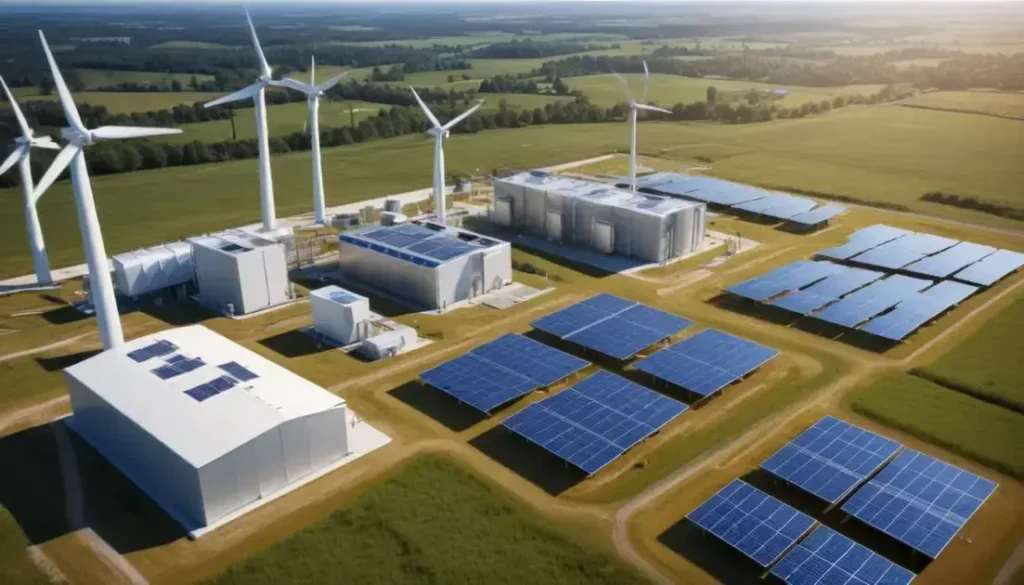Hydrogen racing technology significantly reduces emissions while enhancing performance, making it a sustainable option for the motorsport industry and attracting environmentally conscious fans to the future of racing.
The emergence of hydrogen technology in motorsport is capturing global attention, highlighting its potential for revolutionising racing environments. Are we ready for this shift?
Introduction to Spark Racing Technology
Spark Racing Technology is paving the way for innovative solutions in motorsport, emphasising the use of alternative fuels such as hydrogen. With their pioneering 25 debut at Goodwood, they have unveiled a new chapter in eco-friendly racing. This initiative showcases the enormous potential of hydrogen as a clean energy source, ready to challenge traditional fuels.
The focus on performance capabilities mirrors the safety and environmental commitments of the racing community. By integrating hydrogen fuel cell technology into race cars, Spark Racing aims to lead a sustainable shift without sacrificing speed or excitement. Hydrogen vehicles not only promise lower emissions but also offer a thrilling driving experience.
In partnership with leading industry experts, Spark Racing’s commitment extends beyond the racetrack. The insights gained from this venture may influence future automotive technologies, encouraging manufacturers to explore greener alternatives. This critical juncture represents an opportunity for UK businesses to adopt similar technologies, fortifying their positions in the evolving energy landscape. With the demand for sustainable solutions growing, the implications for innovation in motorsport are profound.
The Pioneer 25 debut at Goodwood
The Pioneer 25 made a significant impact during its debut at Goodwood, showcasing the capabilities of hydrogen technology in motorsport. This event marked a crucial moment for Spark Racing Technology, demonstrating how racing can align with modern sustainability goals.
Equipped with a hydrogen fuel cell, the Pioneer 25 stands out as a beacon of innovation in a traditionally fuel-intensive sport. The vehicle’s design is not just about aesthetics; it embodies a commitment to reducing emissions while maintaining high performance standards. Spectators were treated to an exhilarating display of speed and efficiency.
During the event, the response from the audience highlighted a growing enthusiasm for eco-friendly alternatives in racing. The Pioneer 25’s technical specifications underline its potential to revolutionise motorsport by integrating sustainable practices without compromising on the thrills associated with racing. This transition opens doors for manufacturers to consider hydrogen as a viable option for performance vehicles.
The attention garnered by the Pioneer 25 at Goodwood may set a precedent for future races, encouraging more teams to explore similar technologies. As the conversation around climate change intensifies, the combination of racing and sustainability will likely engage both fans and industry leaders alike, paving the way for a new era in motorsport.
Performance capabilities of hydrogen race cars
The performance capabilities of hydrogen race cars are becoming increasingly impressive, offering a glimpse into the future of sustainable motorsport. These vehicles are engineered not only for their ecological benefits but also for their high-speed performance and agility on the track.
Unlike traditional internal combustion engines, hydrogen fuel cells generate power through a chemical reaction between hydrogen and oxygen, producing water as the only byproduct. This technology allows race cars to achieve rapid acceleration while significantly reducing emissions. Many racers are already noticing how hydrogen vehicles deliver torque instantly, which enhances their responsiveness during races.
Moreover, advancements in battery storage and lightweight materials contribute to the overall speed and handling of hydrogen race cars. As teams continue to optimise these technologies, they are uncovering new potentials for speed and efficiency. Testing at various track conditions has shown that these vehicles can compete with and even outperform traditional race cars.
The commitment to developing hydrogen technology in racing reflects wider trends in the automotive industry, as manufacturers seek cleaner alternatives. With further investment and innovation, hydrogen race cars are set to redefine what is possible in motorsport, paving the way for more sustainable racing experiences that excite fans and promote ecological responsibility.
Impact of hydrogen fuel cells on emissions
The impact of hydrogen fuel cells on emissions is pivotal in the quest for sustainable transport solutions. As governments and industries worldwide push for reduced carbon footprints, hydrogen technology emerges as a leading contender in clean energy advancements. Unlike traditional fossil fuels, hydrogen fuel cells produce only water vapour as a byproduct, dramatically lowering greenhouse gas emissions.
When integrated into race cars, hydrogen fuel cells not only enhance performance but also contribute significantly to a cleaner environment. Observations from various motorsport events illustrate that hydrogen-powered vehicles can operate at high speeds without releasing harmful pollutants. This shift represents a substantial step towards achieving zero-emission racing.
Furthermore, the scalability of hydrogen technology presents a unique opportunity for broader adoption across sectors, including public transport and passenger vehicles. By leveraging existing refuelling infrastructure and developing new hydrogen stations, cities can facilitate a smoother transition to eco-friendly options. The potential for reducing urban air pollution is immense, creating healthier living environments for communities.
The ongoing investment in research and development for hydrogen solutions underscores a commitment to sustainable progress. As more manufacturers adopt this technology, the collective impact on emissions can shift industry standards, inspiring further innovations and strategies to combat climate change.
Feedback from drivers and industry experts
Feedback from drivers and industry experts regarding hydrogen racing technology is overwhelmingly positive, highlighting its potential to transform motorsport for the future. Many drivers express excitement about the unique driving experience that hydrogen-powered vehicles offer. The instant torque delivered by hydrogen fuel cells allows for quick acceleration, making races thrilling and competitive.
Industry experts note significant advancements in the hydrogen sector, praising the commitment to sustainability without compromising performance. According to several engineers involved in hydrogen racing, these vehicles represent a leap forward in combining eco-friendliness with the demands of high-speed racing.
Moreover, many drivers comment on the responsiveness and handling of hydrogen cars, which can turn tight corners with precision. This agrees with the growing trend in motorsport, where performance and sustainability must work hand-in-hand. Additionally, the feedback often touches on the need for more investment and infrastructure for hydrogen refuelling stations, which could further enhance the viability of hydrogen racing.
Such insights are vital as they reflect the changing landscape of the racing industry. Encouraging developments in hydrogen technology inspire confidence among stakeholders, fueling interest in eco-friendly motorsport. As more voices support this shift, the future of racing appears promising, aligning entertainment with environmental responsibility.
The significance of eco-friendly innovations in motorsport
The significance of eco-friendly innovations in motorsport cannot be overstated, as they play a crucial role in steering the industry towards a sustainable future. As environmental concerns continue to rise, racing organisations are increasingly adopting greener technologies and practices. This shift is not only beneficial for the planet but also aligns with the evolving expectations of fans and sponsors.
Among the forefront of these innovations is the integration of hydrogen fuel cells, which provide a cleaner alternative to conventional fuels. These advancements demonstrate that performance and sustainability can coexist harmoniously, leading to exhilarating racing experiences while minimising ecological harm. The success of hydrogen-powered vehicles showcases a viable path for future technological developments.
Moreover, eco-friendly initiatives in motorsport serve as a powerful branding tool for manufacturers. Companies that embrace sustainability attract environmentally conscious consumers, enhancing their reputation in the market. This transformation is vital, as it drives collaboration between teams, sponsors, and automotive manufacturers to invest in sustainable technologies.
Ultimately, the push for eco-friendly innovations reflects a broader commitment to addressing climate change. As motorsport continues to evolve, the embrace of green technologies will likely influence other sectors, demonstrating the potential for change when passion for speed meets responsibility for the environment.
Spark Racing Technology’s focus on e-mobility
Spark Racing Technology’s focus on e-mobility highlights a significant shift in the automotive industry, particularly in motorsport. This innovative approach integrates electric technologies with traditional racing, leading to enhanced performance capabilities and reduced environmental impact. By prioritising e-mobility, Spark Racing positions itself as a leader in the transition towards sustainable motorsport.
The company is dedicated to developing state-of-the-art electric race vehicles that feature advanced battery systems and energy recovery technologies. These vehicles not only deliver impressive speed and agility but also contribute significantly to lowering carbon emissions during races. This commitment to sustainability resonates with a growing audience that values ecological responsibility alongside thrilling performance.
Moreover, Spark Racing’s collaborations with technology firms aim to accelerate the adoption of electric powertrains across various racing formats. By working together, they can innovate solutions that push the boundaries of electric racing. This cooperative effort fosters the exchange of knowledge and resources, essential for tackling the challenges associated with e-mobility.
The focus on e-mobility not only enhances the appeal of motorsport to a new generation of fans but also attracts sponsors looking to align with sustainable practices. As Spark Racing Technology champions this cause, it sets a benchmark for others in the industry, proving that electric solutions can redefine the future of racing.
Future developments in hydrogen racing technology
The future developments in hydrogen racing technology promise to reshape the landscape of motorsport. As advancements in fuel cell technology continue to evolve, there is significant potential for increased performance and efficiency. Research into lighter materials and improved energy storage solutions will enhance the competitive edge of hydrogen-powered vehicles.
Innovation is also focusing on enhancing the overall racing experience. Engineers are working to optimise the refuelling process, making it quicker and more convenient for teams during races. This improvement could mimic the efficiency of conventional pit stops while maintaining the environmental benefits of hydrogen.
Moreover, collaborations between automotive manufacturers and racing organisations are expected to accelerate technological breakthroughs. By sharing knowledge and resources, these partnerships can drive research and development efforts, leading to more effective hydrogen systems. Increased investment from sponsors who prioritise sustainability will further fuel this progress.
As hydrogen technology becomes more mainstream, it is likely to inspire new regulatory frameworks that promote the integration of sustainable practices in all levels of racing. This shift not only supports environmental goals but also enhances the attractiveness of motorsport to a broader, eco-conscious audience. The future of hydrogen racing is bright, driven by innovation that prioritises both performance and sustainability.
Implications for the UK racing industry
The implications for the UK racing industry regarding the shift towards hydrogen-powered vehicles are profound. As the demand for sustainability increases, motorsport in the UK faces pressure to innovate and adapt. Embracing hydrogen technology not only aligns with global environmental goals but also positions the UK as a leader in sustainable racing.
Adopting hydrogen fuel technology can lead to significant changes in race formats and regulations. With its low emissions and high performance capabilities, hydrogen racing could attract a new generation of fans interested in eco-friendly practices. This shift is vital for maintaining the sport’s relevance in an evolving cultural landscape that prioritises environmental responsibility.
Moreover, the UK racing industry can benefit from partnerships with technology firms and research institutions focused on hydrogen energy solutions. Such collaborations can fuel advancements in vehicle design and performance, driving the entire sector towards greater innovation and efficiency. Additionally, investments in infrastructure, such as hydrogen refuelling stations, will be necessary to support this transition.
As the industry adapts, it may also create new job opportunities in engineering, sustainability, and management. The move towards hydrogen not only enhances the competitive edge of UK motorsport but also showcases the country’s commitment to pioneering future technologies, reinforcing its position on the global stage.
In conclusion, the future of hydrogen racing technology
The future of hydrogen racing technology presents exciting opportunities for the motorsport industry, especially in the UK. By embracing hydrogen, the racing world can reduce emissions and enhance performance while attracting a new audience that values sustainability.
As teams adapt to this innovative technology, they can work together with engineers and researchers to overcome challenges and explore new frontiers in racing. This collaboration can lead to improved vehicle designs and faster refuelling solutions, making hydrogen a viable option for competitive racing.
Ultimately, the integration of hydrogen technology can redefine what motorsport means, aligning it with the global push for environmentally friendly solutions. With these advancements, the UK racing industry has the chance to lead in sustainable practices and inspire future generations.
So, as we look ahead, it’s clear that hydrogen racing is not just a trend—it’s a commitment to a cleaner and more thrilling future in motorsport.
Frequently Asked Questions
What are the benefits of hydrogen racing technology?
Hydrogen racing technology offers lower emissions and high performance, making it an environmentally friendly option that attracts eco-conscious fans.
How does hydrogen fuel work in racing cars?
Hydrogen fuel cells convert hydrogen into electricity, powering electric motors while producing only water vapour as a byproduct.
What is the significance of e-mobility in motorsport?
E-mobility represents the integration of electric technologies in racing, leading to improved sustainability and performance, appealing to a modern audience.
How can the UK racing industry adapt to these changes?
The UK racing industry can adapt by investing in hydrogen infrastructure, collaborating with technology firms, and embracing sustainable practices in racing.
What challenges does the hydrogen racing sector face?
Challenges include the need for more refuelling stations, investment in technology, and overcoming regulatory hurdles to ensure safety and efficiency.
Will fans embrace hydrogen-powered racing?
Yes, many fans are increasingly interested in environmentally sustainable practices, making hydrogen-powered racing an exciting and relevant option for the future.


